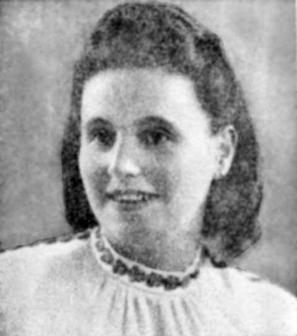Despite the odds, one woman refused to let the Nazis decide her fate.
Malka “Mala” Zimetbaum was born on Jan. 26, 1918 in Brzesko, Poland. Her family later moved to Antwerp, Belgium, arriving on Nov. 17, 1926.
By all accounts, Mala was a brilliant student, notably in languages and mathematics. She had to drop out of school because her father, who worked in a diamond factory became blind. Mala began working in the same factory to make money for the family.
She was 24 years old when she was arrested during the third Antwerp raid of Sept. 11-12, 1942. She was held in the Dossin Barracks in Mechelen, a city in the province of Antwerp. On Sept. 15, she was transferred to Belgian Transport 10. Its destination – Auschwitz-Birkenau concentration camp. During the initial selection, she was sent to the women’s camp in Birkenau. She was no longer 24-year old Mala. She was #19880.
Life expectancy, if you survived initial selection and weren’t sent straight to the gas chambers was a few months. Mala, had an advantage. She was fluent in Flemish, French, German, Polish, and Italian. Some sources include Yiddish. She became an interpreter for the camp.
Mala could have lived her life in the camp in comfort. Her position provided her with better food and housing conditions. She received warm winter clothes and could take showers. If she got sick, she was taken to the Aryan hospital in the camp which excluded patients from being taken to the gas chamber.
Mala didn’t sit back and enjoy this privileged position. Everyone – staff and prisoners – trusted her. That trust could have corrupted her, but Mala could not be corrupted. She used her position to save as many prisoners as possible.
She spent nearly all of her time helping other inmates. When she though they were not fit for hard labor, she advocated to get them easier work.
As Giza Weisblum relates:
One of Mala’s responsibilities was to assign the sick released from the hospital to various work details. She always tried to send the women who were still weak from their illnesses to the lightest type of work. Also, she always warned the patients of the coming selections, urging them to leave the hospital as quickly as possible. In this way, she saved the lives of many women.
She warned inmates when selections were coming to the infirmary, giving them time to leave and thus be saved.
She illegally took photographs that were sent to prisoners from inmates out of their files and gave them to the prisoners.
She swiped food and medicine to people who needed it. She always found a way to cheer people up and encouraged them in this most dismal place.
Mala survived for two years in the camp. She was also the only Jewish woman to escape from Auschwitz. Mala had fallen in love with Edward, “Edek” Galiński, who worked in the women’s camp as an mechanic. The couple planned to escape on June 24, 1944. It was a weekend and there would be fewer guards. Mala wanted to tell the world what was happening and save more people.
Edek, wearing an SS uniform he stole, escorted Mala out of the camp for work duty installing a washbasin. Mala had stolen civilian clothes and had them on under her prisoner outfit. She was disguised as a man. Edek showed the guard a forged pass.
The ruse worked. Unfortunately, they were caught on July 6, by a German patrol in the Beskid Zywiecki mountains at the Slovakia border. The patrol became suspicious of Mala when she tried to purchase bread with gold stolen from the camp. When Edek saw her being arrested, he surrendered as well. They had made a promise to never separate.
The couple were returned to Auschwitz. They were tortured in “the bunker” in Block 11 in the main camp. Edek was eventually put in a cell with another man where he scratched his and Mala’s names and camp numbers into the wall.
A friendly guard passed notes to them from each other. Mala and Edek whistled to each other down the hall. When he was permitted to go outside for exercise, Edek would stand near Mala’s window and sing Italian arias.
On Sept. 15, 1944, the couple were brought outside together for their execution. They were to be executed at the same time, he in the men’s camp, she in the women’s.
Edek put his head in the noose before the guards read his verdict. They had to pull him back and force him to stand on the platform. Edek tried to yell, “Long live Poland,” but couldn’t get the entire phrase out as the stood was kicked out from under him. The prisoners removed their caps in respect to Edek.
All Jewish women were forced to watch her hanging, but Mala’s execution did not go as smoothly as the Nazies had hoped. Somehow, Mala had gotten a hold of a razor blade. As her sentence was read, she slit the veins inside her elbows.
SS officer Ruitters tried to take the razor blade away. Mala smacked the SS commandant in the face with her bloody arm and yelled, “I will die a heroine while you’ll die as pigs.”
Other accounts claim she told the women they would be liberated soon and they should revolt because risking their life and dying trying was better than life in Auschwitz.
The SS reportedly beat her and taped her mouth shut. SS officer Maria Mandel said Mala was to be burned alive in the crematorium. She was taken to the infirmary where nurses wrapped her arms as slowly as possible. They hoped she would die before reaching the crematorium. Mala told the prisoners, “the day of reckoning is near.”
On the way to the crematorium, Zimetbaum told the women pulling the handcart she was on that she knew she could have survived, but she chose not to because she wanted to follow what she believed in.
Accounts of her death differ. Some said she bled to death on the cart. Others report that a guard took pity on her and shot or poisoned her in the crematorium. Still others observe she had poison on her and took it before she could be burned alive.
The prisoners forced to cremate the corpses had been informed that Zimetbaum was arriving, and they made special preparations. They prayed and cried as they burned her remains. The prisoners who had pulled the handcart then went back to the barracks and told other prisoners what they had witnessed.
It is highly likely that Mala would have survived if she remained within the confines of her “job” the Nazis allowed her to have. Her conscience wouldn’t let her remain idle.
Though her last words vary slightly in survivor accounts, of which they speak warmly of her, they all say she was a courageous woman. She did not yield an inch to the Nazis. Even in her last breath she was defiant and bold, and a heroine.


Leave a Reply